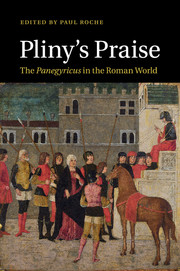Book contents
- Frontmatter
- Contents
- List of contributors
- Preface
- 1 Pliny's thanksgiving: an introduction to the Panegyricus
- 2 Self-fashioning in the Panegyricus
- 3 The Panegyricus and the Monuments of Rome
- 4 The Panegyricus and rhetorical theory
- 5 Ciceronian praise as a step towards Pliny's Panegyricus
- 6 Contemporary contexts
- 7 Politics and the sublime in the Panegyricus
- 8 Down the Pan: historical exemplarity in the Panegyricus
- 9 Afterwords of praise
- Bibliography
- Index locorum
- General index
5 - Ciceronian praise as a step towards Pliny's Panegyricus
Published online by Cambridge University Press: 05 June 2011
- Frontmatter
- Contents
- List of contributors
- Preface
- 1 Pliny's thanksgiving: an introduction to the Panegyricus
- 2 Self-fashioning in the Panegyricus
- 3 The Panegyricus and the Monuments of Rome
- 4 The Panegyricus and rhetorical theory
- 5 Ciceronian praise as a step towards Pliny's Panegyricus
- 6 Contemporary contexts
- 7 Politics and the sublime in the Panegyricus
- 8 Down the Pan: historical exemplarity in the Panegyricus
- 9 Afterwords of praise
- Bibliography
- Index locorum
- General index
Summary
The Panegyricus is rightly regarded as an important specimen of early imperial panegyric: it is frequently singled out as a special text, defined as the only extant oration from ancient Rome between Cicero's Philippics and the imperial panegyrics of the third and fourth centuries. As it is the only surviving example of a panegyric oration from the early empire, it is sometimes even seen as inaugurating a new literary genre in that this speech became a paradigmatic model that started off a series of imperial prose panegyrics. The claim to novelty with respect to Pliny's Panegyricus is certainly true in the sense that, obviously, imperial panegyric did not exist prior to the establishment of the principate and Pliny's text is the earliest extant specimen in prose dating to this period. However, this focus on new features and later developments may not be sufficient for a full assessment of Pliny's Panegyricus. For it is a priori unlikely that any social and cultural customs or the corresponding literary texts in this period were entirely new creations rather than developments of conventions already established in Rome. Indeed, panegyric seems to have existed in Roman society from its inception, appearing in a variety of contexts that are not even restricted to the spoken or written word (cf. e.g. ancestors' masks, triumphal processions). In textual form panegyric may feature in self-contained pieces or as an element in almost any literary genre in both poetry and prose.
- Type
- Chapter
- Information
- Pliny's PraiseThe Panegyricus in the Roman World, pp. 85 - 103Publisher: Cambridge University PressPrint publication year: 2011
- 4
- Cited by



